There would be no modern Ukraine without Jews. And there would be no State of Israel without Ukraine.
This should be a truism. Yet, for many in the 21st century, the tie is not immediately obvious. Often, Ukraine is remembered as a place where Jews were killed, both by Bohdan Khmelnytskyi in the 17th century and by Adolf Hitler’s Nazis and local collaborators in the 20th.
Meanwhile, fewer recognize that many of the founding fathers of Israel came from what is today Ukraine. Many are unaware that Zionism and Ukrainian nationalism both emerged as national liberation movements for minorities in the Russian Empire.
Few know that Vladimir Ze’ev Jabotinsky — the founder of revisionist Zionism and the spiritual father of Israeli Prime Minister Benjamin Netanyahu’s Likud Party — was a Russian-language writer from Odesa who viewed Jews and Ukrainians as allies in the struggle for democratization in the empire.
Often, the hard facts of history obscure the lives lived amid its cataclysmic events. The following are five books — both novels and memoirs — that offer a unique and engaging window into Jewish history in Ukraine from the late 19th century to the present.
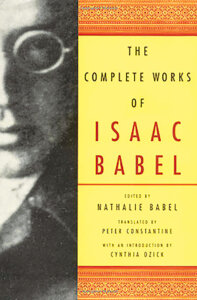
1. The Complete Works of Isaac Babel
By Isaac Babel, translated by Peter Constantine, published by W. W. Norton & Company (2002). Available on Amazon.com.
Isaac Babel was one of the greatest writers of the early Soviet period, a man whose important contribution to world literature was cut short by his 1940 murder in the Stalinist purges.
Born in Odesa in 1894, he grew up in the city’s storied Moldavanka neighborhood. Babel would describe and mythologize Moldavanka in his “Odessa Tales,” which tell the stories of the neighborhood’s Jewish gangsters and, particularly, mob boss Benya Krik.
Babel is also renowned for “Red Cavalry,” a fictional account of his experiences covering the Polish-Soviet War of 1920. Although Babel was a pro-Soviet writer, his works are far from propaganda, offering a nuanced and realistic look at the horrors of war — including anti-Semitic violence committed by both the Red and White armies. “Red Cavalry” is also the tale of a bespectacled Jewish intellectual’s personal adaptation to the brutalities of war.
Readers also should not ignore Babel’s “early stories,” which humanely depict life in Odesa and beyond. Of particular merit are the stories “Mama, Rimma, and Alla,” which deals with a teenage pregnancy, and “Elya Isaakovich and Margarita Prokofievna,” which tells of the relationship between a Jewish merchant from Odesa and a Russian prostitute.
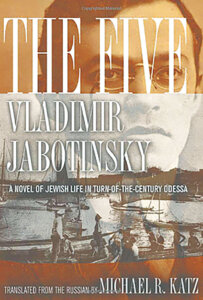
2. The Five: A Novel of Jewish Life in Turn-of-the-Century Odessa
By Vladimir Jabotinsky, translated by Michael R. Katz, published by Cornell University Press (2005). Available on Amazon.com in print and for Kindle.
Today, Jabotinsky is mostly remembered as a political activist and the icon of Israel’s Likud Party — a figure somewhat like Ronald Reagan for the U. S. Republican Party.
However, in his youth, Jabotinsky was one of the most acclaimed journalists and writers of the Russian Empire. First published in Russian in 1936, “The Five” tells the story of an Odesa-born Jewish journalist’s acquaintance with the upper-middle class Milgrom family. It also traces the often tragic fates of the family’s five children, as they grow up amid the tumultuous decline of the Russian Empire in the early 20th century.
While a work of fiction, “The Five” is deeply autobiographical, offering a window into Jabotinsky’s youth. It is also his homage to the city of Odesa and the Jewish community that lived there when he was a young man. At several points in the novel — specifically when Jabotinsky describes the events of the 1905 revolution or a public gathering where a student delivers an anti-Semitic diatribe — the reader gets the sense that he or she is witnessing historical events not simply as they were written in the history books, but as the people of Odesa experienced them in reality.
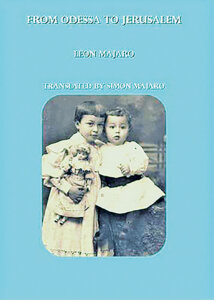
3. From Odessa to Jerusalem
By Leon Majaro, translated by Simon Majaro, Majaro Publications (2010). Available on Amazon.com and for Kindle, but can be read for free in its entirety on Google Books.
Memoirs are a complicated genre. At best, they present a captivating, albeit highly subjective, view of history according to the people who lived it. At worst, they can be awkwardly amateurish and mundane, particularly when the author is not a professional writer.
“From Odessa to Jerusalem,” the memoir of the late Israeli doctor Leon Majaro, strikes the perfect balance between these extremes, providing a panoramic view of life in turn-of-the‑20th-century Odesa. Majaro’s writing is unpretentious and anecdotal, deeply interesting, often humorous and never navel-gazey.
Born in 1892 as Lev Mojarowsky, Majaro grew up in an upwardly mobile middle-class Jewish family in Odesa. His father ran the printing facilities of the storied Odesskiye Novosti newspaper and was acquainted with Jabotinsky, one of its journalists.
The memoir begins with a description of Majaro’s rather idyllic childhood. However, that is hardly the tone of the entire text: it also describes the 1905 pogrom, Majaro’s service as a Russian army medic on the typhus-ravaged Turkish Front in World War I, and the events of the 1917 revolution. The post‑1917 chaos would ultimately lead Majaro to leave Odesa for Palestine and tragically lose contact with his parents and sister, who stayed behind in the Soviet Union.
At times funny, touching, tragic, and always fascinating, “From Odessa to Jerusalem” is a must-read for anyone interested in Jewish, Ukrainian, Russian, or Odesan history. Readers owe a debt of gratitude to Majaro’s son, Simon, for translating his father’s memoir from Hebrew and making it available to the public.
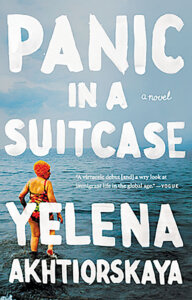
4. Panic in a Suitcase
By Yelena Akhtioirskaya, published by Riverhead Books (2014). Available on Amazon.com and for Kindle.
Yelena Akhtiorskaya was born in Odesa in 1985 and immigrated with her family to the United States at the age of seven. She is also the niece of Russian-language Ukrainian poet Boris Khersonsky.
These details are important to understanding her debut novel “Panic in a Suitcase,” which tells the story of the Nasmertovs, a family split between those who immigrated to Brooklyn’s largely Russian speaking Brighton Beach neighborhood and those who stayed behind. Chief among the remainers is Pasha, a sickly poet who has chosen to convert from Judaism to Russian Orthodoxy.
If two of the previous books in this list were written by people who were separated from their families and pasts by emigration — Jabotinsky and Majaro — this one is about the mobility and divided identities of the 21st century. It chronicles two visits by Pasha Nasmertov to New York City and one visit by his niece to Odesa.
More broadly, it looks at two facets of Jewish immigration from the former Soviet Union: those who built a photocopy of their old lives in Brighton Beach and those who stayed behind to live — perhaps more authentically — in Odesa.
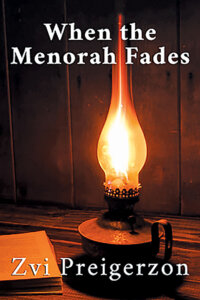
5. When the Menorah Fades
By Zvi Preigerzon. Translated by Binyamin Shalom, to be published by Academic Studies Press later this year.
Finally, a book to look forward to. “When the Menorah Fades” was briefly published in English independently in 2018. Now, that version is out of print, but Academic Studies Press will republish the novel later this year, according to the author’s grandson, who leads the Zvi Preigerzon Foundation.
This is good news. Zvi Preigerzon’s personal story is fascinating and his novel shows us Jewish life in Soviet Ukraine on the eve of the Holocaust.
Born in the western Ukrainian town of Shepetivka in 1900, Preigerzon received one year of education at the historic Herzliya Gymnasium in Tel Aviv, where he mastered the Hebrew language. Then, while Preigerzon was home on vacation, World War I erupted, stranding him in Ukraine.
Despite his desire to settle in the Holy Land, Preigerzon would never return there. Instead, he forged a career as a top scientist in Moscow, all the while secretly writing short stories and novels in Hebrew.
But that was a dangerous avocation in the USSR, where Hebrew was virtually a banned language. Preigerzon would later be arrested and spend over 5 years in a labor camp for his work.
“When the Menorah Fades” tells the story of several Jewish families in the Ukrainian city of Hadiach. It shows how Soviet secularism and social change slowly eroded their age-old traditions, how changing economic policies undermined their traditional trades, and how the local Jews coexisted with their Ukrainian neighbors. In particular, the novel presents a surprisingly frank — if somewhat indirect — depiction of desire and sexuality in the otherwise conservative environs of late 1930s Ukraine.
The menorah in question is an eternal flame that burns at the grave of Schneur Zalman of Liady, the founder of the Chabad Hasidic movement. That flame is snuffed out only when the Nazis murder and drive out the Jews of Hadiach in the novel’s conclusion.
But Preigerzon’s work was not snuffed out. His family managed to preserve his archive when they emigrated from the Soviet Union to Israel. Now, one of his novels will even be available in English.
You can also highlight the text and press Ctrl + Enter


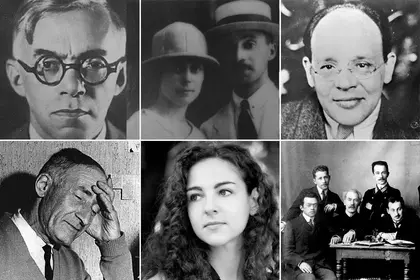

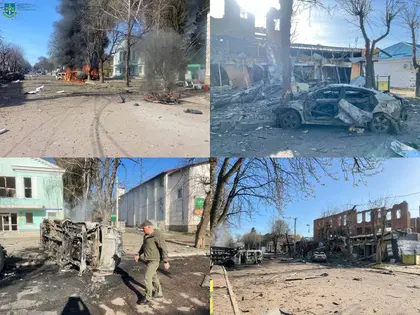


Comments (0)